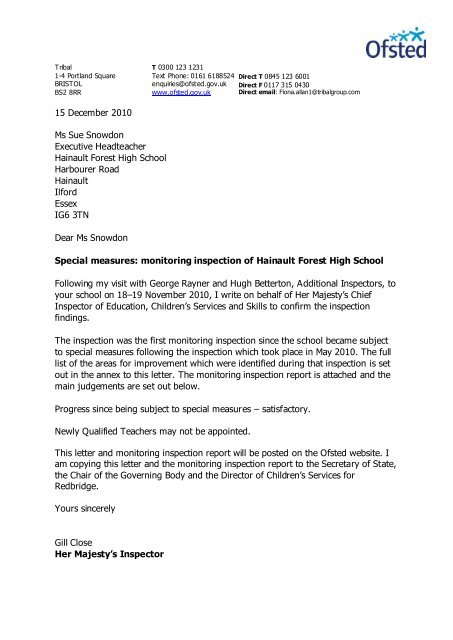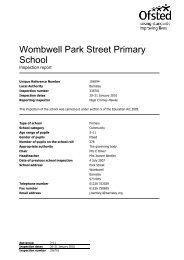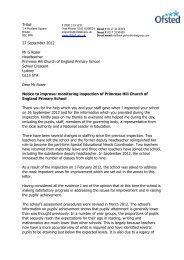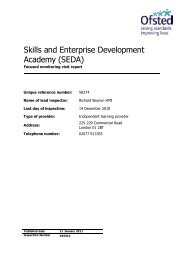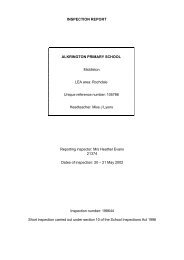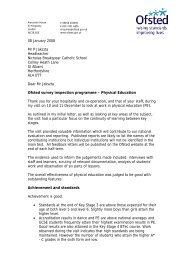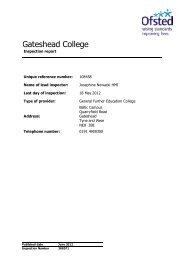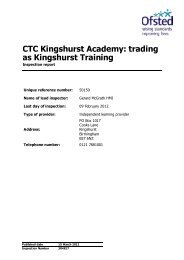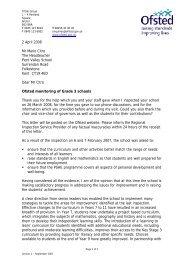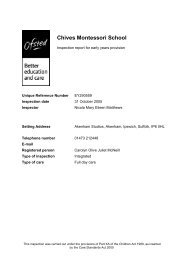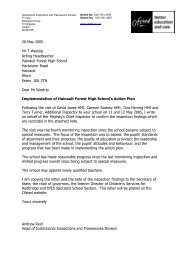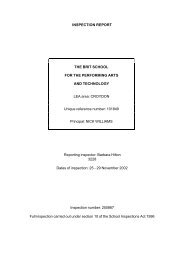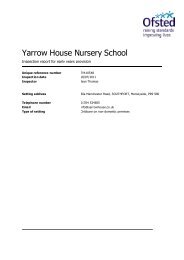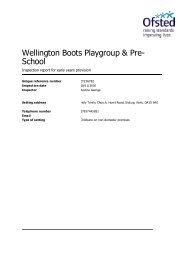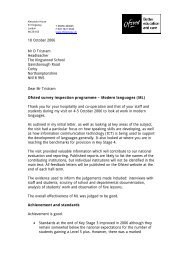pdf Section 8 inspection report - Ofsted
pdf Section 8 inspection report - Ofsted
pdf Section 8 inspection report - Ofsted
Create successful ePaper yourself
Turn your PDF publications into a flip-book with our unique Google optimized e-Paper software.
Tribal<br />
1-4 Portland Square<br />
BRISTOL<br />
BS2 8RR<br />
15 December 2010<br />
Ms Sue Snowdon<br />
Executive Headteacher<br />
Hainault Forest High School<br />
Harbourer Road<br />
Hainault<br />
Ilford<br />
Essex<br />
IG6 3TN<br />
Dear Ms Snowdon<br />
Special measures: monitoring <strong>inspection</strong> of Hainault Forest High School<br />
Following my visit with George Rayner and Hugh Betterton, Additional Inspectors, to<br />
your school on 18–19 November 2010, I write on behalf of Her Majesty’s Chief<br />
Inspector of Education, Children’s Services and Skills to confirm the <strong>inspection</strong><br />
findings.<br />
The <strong>inspection</strong> was the first monitoring <strong>inspection</strong> since the school became subject<br />
to special measures following the <strong>inspection</strong> which took place in May 2010. The full<br />
list of the areas for improvement which were identified during that <strong>inspection</strong> is set<br />
out in the annex to this letter. The monitoring <strong>inspection</strong> <strong>report</strong> is attached and the<br />
main judgements are set out below.<br />
Progress since being subject to special measures – satisfactory.<br />
Newly Qualified Teachers may not be appointed.<br />
This letter and monitoring <strong>inspection</strong> <strong>report</strong> will be posted on the <strong>Ofsted</strong> website. I<br />
am copying this letter and the monitoring <strong>inspection</strong> <strong>report</strong> to the Secretary of State,<br />
the Chair of the Governing Body and the Director of Children’s Services for<br />
Redbridge.<br />
Yours sincerely<br />
Gill Close<br />
Her Majesty’s Inspector<br />
T 0300 123 1231<br />
Text Phone: 0161 6188524<br />
enquiries@ofsted.gov.uk<br />
www.ofsted.gov.uk<br />
Direct T 0845 123 6001<br />
Direct F 0117 315 0430<br />
Direct email: Fiona.allan1@tribalgroup.com
Annex<br />
The areas for improvement identified during the <strong>inspection</strong> which took<br />
place in May 2010<br />
� Raise students’ attainment and achievement by:<br />
maintaining consistently high expectations of students’ performance<br />
training staff on using data effectively to monitor the progress of students<br />
and to plan appropriate learning activities<br />
utilising effectively a range of partnerships to help raise attainment and<br />
improve teaching and learning.<br />
� Improve the quality of teaching and learning by:<br />
making sure that the whole-school focus is consistently upon the quality<br />
of delivery in the classroom<br />
providing regular opportunities for staff to share ideas and to observe<br />
each other teach<br />
focusing the monitoring and evaluation of lessons more sharply on what<br />
teachers need to do to improve<br />
ensuring students receive their ICT entitlement to support their learning<br />
and independent study.<br />
� Improve behaviour, through the consistent and rigorous application of the<br />
school’s classroom management procedures, so that learning is not impeded.<br />
� Raise attendance by:<br />
identifying early those at risk of poor attendance<br />
planning enjoyable and relevant learning opportunities which encourage<br />
students to attend school.<br />
� Improve outcomes in the sixth form by:<br />
providing a suitable curriculum that meets the academic needs of all<br />
students<br />
making full use of local partnerships to enhance the quality of provision.
Special measures: monitoring of Hainault Forest High School<br />
Report from the first monitoring <strong>inspection</strong> on 18–19 November 2010<br />
Evidence<br />
Inspectors observed the school’s work, scrutinised documents and spoke with the<br />
executive headteacher, associate headteacher, staff, groups of students, the Chair of<br />
the Governing Body, a representative from the local authority and the School<br />
Improvement Partner.<br />
Context<br />
Since the last <strong>inspection</strong>, the school has formed a partnership with a successful local<br />
school. The headteacher from that school has become the executive headteacher at<br />
Hainault Forest. An associate headteacher has been seconded from the partner<br />
school to take day-to-day charge of the running of Hainault Forest. The local<br />
authority has seconded two of its staff to the school’s senior leadership team. The<br />
size of the sixth form has increased to 120 students. The pastoral structure is now<br />
based on single-age year groups rather than mixed-age groups.<br />
Pupils’ achievement and the extent to which they enjoy their learning<br />
Students say they are enjoying their learning more. Contributory factors are that<br />
activities are better organised and fewer lessons are taught by short-term temporary<br />
staff. Expectations of pace in lessons have improved, but expectations do not always<br />
convey well enough the quality of work needed from all students or provide<br />
sufficient challenge, especially for higher attainers. The school’s records and<br />
<strong>inspection</strong> evidence show that the proportion of lessons in which students make<br />
inadequate progress has fallen, but there are still too many occasions when students<br />
do not achieve their potential. There remain, however, lessons in which students<br />
make at least good progress because of the strength of the teaching.<br />
The 2010 results show a rise in the proportion of students gaining five GCSE grades<br />
A* to C including English and mathematics, a reflection of the school’s speedy<br />
actions following the last <strong>inspection</strong>. Nevertheless, attainment at Key Stage 4 fell in<br />
some subjects. There are signs that attainment at Key Stage 3 in the core subjects<br />
of English, mathematics and science improved in 2010. However, achievement in the<br />
sixth form fell across the range of courses.<br />
The school’s data for current students use finer gradations at Key Stage 4 to identify<br />
attainment near borderlines more easily. Although the accuracy of these<br />
assessments is an area for development, there are indications that Year 11 students<br />
are on track to improve attainment, motivated by early entry for GCSE and a<br />
subsequent chance to re-sit. The closer match of Year 10 courses to students’ needs
has the potential to raise standards, but it is too soon for data to show the impact<br />
on students’ progress and attainment.<br />
Progress since the last section 5 <strong>inspection</strong> on the areas for improvement:<br />
� Raise students’ attainment and achievement by:<br />
maintaining consistently high expectations of students’ performance<br />
training staff on using data effectively to monitor the progress of students<br />
and to plan appropriate learning activities<br />
utilising effectively a range of partnerships to help raise attainment and<br />
improve teaching and learning – satisfactory.<br />
Other relevant pupil outcomes<br />
Students say they are more proud of the school and wear the uniform more smartly.<br />
Inspectors found students polite to adults during their visit. In lessons seen,<br />
students applied themselves to their work and behaved soundly. There is improved<br />
consistency in managing low-level disruption in lessons, although some still occurs.<br />
Rules are more clearly emphasised and behaviour has improved. Students say they<br />
feel safer and more confident to <strong>report</strong> any bullying, which is dealt with more<br />
effectively. Exclusions have fallen in number and are having a better impact on<br />
future behaviour.<br />
Attendance levels this term are similar to those at the same time last year although<br />
the number of students who have a high level of absence has fallen slightly. Heads<br />
of year are more focused on dealing quickly with attendance issues and some<br />
changes have been made in working with families to raise attendance. However,<br />
improvement has been slow and there is much more to do to ensure that the impact<br />
of these initiatives is evident by next term. Students <strong>report</strong> that attendance at<br />
lessons has improved because teaching is more effective.<br />
Progress since the last section 5 <strong>inspection</strong> on the areas for improvement:<br />
� Improve behaviour, through the consistent and rigorous application of the<br />
school’s classroom management procedures, so that learning is not impeded –<br />
satisfactory.<br />
� Raise attendance by:<br />
identifying early those at risk of poor attendance<br />
planning enjoyable and relevant learning opportunities which encourage<br />
students to attend school – satisfactory.<br />
The effectiveness of provision<br />
Teaching is improving. There is a lower proportion of inadequate lessons than at the<br />
time of the last <strong>inspection</strong>. Nevertheless, much teaching is no better than
satisfactory, so does not enable students to overcome previous underachievement to<br />
reach the standards of which they are capable. The move away from supply<br />
teachers and the appointment of cover supervisors have given more consistency and<br />
better knowledge of the students’ needs. The linking of teaching assistants to<br />
subjects has provided more focused support. Revised guidance on planning has<br />
contributed to more structured lessons and better time management. The lessons<br />
observed reflected good relationships between staff and students, who showed<br />
sound attitudes to work even when it was not sufficiently demanding. The stronger<br />
lessons were characterised by activities that were well tailored to students’ needs,<br />
challenging questions that extended understanding and clear guidance on what<br />
students needed to do to improve.<br />
In the satisfactory or weaker lessons observed, teachers spent too long talking and<br />
did not involve students in activities that developed their independence or thinking<br />
skills. Work was not targeted effectively enough to challenge all students,<br />
particularly the higher attainers in the class. Teachers did not ensure that all<br />
students answered questions or check everyone’s understanding. Some students<br />
who speak English as an additional language were not given explanations of the<br />
meanings of key words or phrases within the work being taught. Marking of<br />
students’ work was sometimes scant, so students were unsure whether it was<br />
correct, and there was little guidance on how to improve. Students had a clearer<br />
understanding of how to reach their targets in some subjects than in others.<br />
Senior leaders acted quickly after the last <strong>inspection</strong> to alter the options offered to<br />
the current Year 10 students in order to provide a wider range of vocational courses<br />
that better meet everyone’s needs, including some offered by partners. The<br />
refurbished area for students with special educational needs and/or disabilities is<br />
attractive and welcoming. It is now used better to provide support and enhance<br />
learning. Resources for information and communication technology (ICT) have been<br />
purchased although some technical difficulties impede their use. Changes in ICT<br />
provision in Key Stage 3 provide better access to the required curriculum, although<br />
not all Key Stage 4 students have such access.<br />
Through rapid action since the last <strong>inspection</strong>, senior leaders have substantially<br />
increased the number of students in the sixth form. There is now a wider range of<br />
academic and vocational courses at advanced and lower levels, including some<br />
offered by partners. Entry requirements have been adjusted to improve the match<br />
between student and course, although a few students have recently dropped out.<br />
Leaders have correctly identified the need for improved information, advice and<br />
guidance, and have begun to offer this to Year 11 students. Students are keen to<br />
learn and the school’s data indicate that progress is improving, although a check to<br />
identify and overcome potential slippage was not made early this term.<br />
Progress since the last section 5 <strong>inspection</strong> on the areas for improvement:
� Improve the quality of teaching and learning by:<br />
making sure that the whole-school focus is consistently upon the quality<br />
of delivery in the classroom<br />
providing regular opportunities for staff to share ideas and to observe<br />
each other teach<br />
focusing the monitoring and evaluation of lessons more sharply on what<br />
teachers need to do to improve<br />
ensuring students receive their ICT entitlement to support their learning<br />
and independent study – satisfactory.<br />
� Improve outcomes in the sixth form by:<br />
providing a suitable curriculum that meets the academic needs of all<br />
students<br />
making full use of local partnerships to enhance the quality of provision –<br />
satisfactory.<br />
The effectiveness of leadership and management<br />
Senior leaders quickly made significant changes to the curriculum and the support<br />
for students during the summer term, which improved provision and attainment.<br />
They recognise the need for a substantial change in teaching quality to obtain longterm<br />
improvements in students’ achievement and attainment. Governors are aware<br />
of developments but have not focused their support and challenge on each key issue<br />
or on ensuring there is appropriate external support. Reorganisation of pastoral<br />
structures into year groups and links with the partner school have brought staff<br />
together effectively to concentrate on improvement. Planning for improvement has<br />
narrowed its focus onto key priorities, to which middle leaders have begun to link<br />
their plans. There is a change in impetus, with staff clearly focused on raising<br />
attainment. While some departments have a strong emphasis on raising the quality<br />
of teaching to achieve this, the sense of urgency of this approach is not consistent<br />
across the school.<br />
Senior leaders have taken steps to improve teaching, particularly where it was<br />
weakest. All teachers have been observed and records of areas for development in<br />
their teaching have been produced, with the intention of providing coaching on<br />
them. However, because of the large number of teachers delivering satisfactory or<br />
weaker lessons, a substantial amount of external support is needed to achieve<br />
improvement through this route. Also, it is not clear how incremental improvement,<br />
for example while teaching remains satisfactory, will be judged. Understanding of<br />
how to judge and improve teaching is growing through shared observation with<br />
middle leaders. However, the records of lesson observations give limited evidence of<br />
the progress of students, particularly the higher attainers, and this may contribute to<br />
some generous judgements. The joint observations made by senior leaders during<br />
the <strong>inspection</strong> were accurate. Teachers in some subjects are beginning to share<br />
planning and observation of each other’s lessons.
Class teachers and form tutors have been given some training on the use of data<br />
and are more involved in using records to see how their students are doing. Heads<br />
of year are able to use data more effectively to check who is behind now that they<br />
have records for all students in a year. Nevertheless, the central system does not<br />
provide a simple way for staff to identify any underachievement across the<br />
attainment range. It gives information about attainment, particularly at grade C, in<br />
Key Stage 4 and about progress in Key Stage 3, where calculations are unclear and<br />
detail is too fine.<br />
External support<br />
The local authority’s speedy actions in putting into place senior leaders and a<br />
partnership with a local school have underpinned the satisfactory progress to date.<br />
The local authority’s statement of action meets requirements. Nevertheless, its plans<br />
for action do not contain explicit quantified support for each element within the<br />
areas for improvement, based on negotiation with the school. There is a particular<br />
need now for more external support for raising teaching quality and improving<br />
attendance. Opportunities for involving parents have not been fully explored. The<br />
school has found the financial and professional support from London Challenge<br />
helpful, but does not have a clear view of how it will continue. The School<br />
Improvement Partner has provided useful challenge and practical advice.


